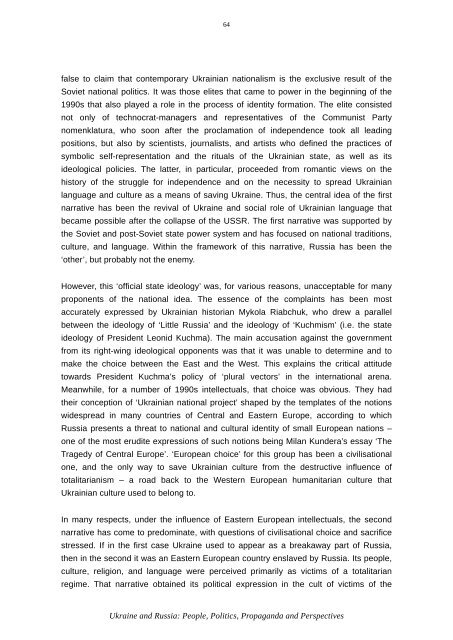Ukraine-and-Russia-E-IR
Ukraine-and-Russia-E-IR
Ukraine-and-Russia-E-IR
Create successful ePaper yourself
Turn your PDF publications into a flip-book with our unique Google optimized e-Paper software.
64<br />
false to claim that contemporary Ukrainian nationalism is the exclusive result of the<br />
Soviet national politics. It was those elites that came to power in the beginning of the<br />
1990s that also played a role in the process of identity formation. The elite consisted<br />
not only of technocrat-managers <strong>and</strong> representatives of the Communist Party<br />
nomenklatura, who soon after the proclamation of independence took all leading<br />
positions, but also by scientists, journalists, <strong>and</strong> artists who defined the practices of<br />
symbolic self-representation <strong>and</strong> the rituals of the Ukrainian state, as well as its<br />
ideological policies. The latter, in particular, proceeded from romantic views on the<br />
history of the struggle for independence <strong>and</strong> on the necessity to spread Ukrainian<br />
language <strong>and</strong> culture as a means of saving <strong>Ukraine</strong>. Thus, the central idea of the first<br />
narrative has been the revival of <strong>Ukraine</strong> <strong>and</strong> social role of Ukrainian language that<br />
became possible after the collapse of the USSR. The first narrative was supported by<br />
the Soviet <strong>and</strong> post-Soviet state power system <strong>and</strong> has focused on national traditions,<br />
culture, <strong>and</strong> language. Within the framework of this narrative, <strong>Russia</strong> has been the<br />
‘other’, but probably not the enemy.<br />
However, this ‘official state ideology’ was, for various reasons, unacceptable for many<br />
proponents of the national idea. The essence of the complaints has been most<br />
accurately expressed by Ukrainian historian Mykola Riabchuk, who drew a parallel<br />
between the ideology of ‘Little <strong>Russia</strong>’ <strong>and</strong> the ideology of ‘Kuchmism’ (i.e. the state<br />
ideology of President Leonid Kuchma). The main accusation against the government<br />
from its right-wing ideological opponents was that it was unable to determine <strong>and</strong> to<br />
make the choice between the East <strong>and</strong> the West. This explains the critical attitude<br />
towards President Kuchma’s policy of ‘plural vectors’ in the international arena.<br />
Meanwhile, for a number of 1990s intellectuals, that choice was obvious. They had<br />
their conception of ‘Ukrainian national project’ shaped by the templates of the notions<br />
widespread in many countries of Central <strong>and</strong> Eastern Europe, according to which<br />
<strong>Russia</strong> presents a threat to national <strong>and</strong> cultural identity of small European nations –<br />
one of the most erudite expressions of such notions being Milan Kundera’s essay ‘The<br />
Tragedy of Central Europe’. ‘European choice’ for this group has been a civilisational<br />
one, <strong>and</strong> the only way to save Ukrainian culture from the destructive influence of<br />
totalitarianism – a road back to the Western European humanitarian culture that<br />
Ukrainian culture used to belong to.<br />
In many respects, under the influence of Eastern European intellectuals, the second<br />
narrative has come to predominate, with questions of civilisational choice <strong>and</strong> sacrifice<br />
stressed. If in the first case <strong>Ukraine</strong> used to appear as a breakaway part of <strong>Russia</strong>,<br />
then in the second it was an Eastern European country enslaved by <strong>Russia</strong>. Its people,<br />
culture, religion, <strong>and</strong> language were perceived primarily as victims of a totalitarian<br />
regime. That narrative obtained its political expression in the cult of victims of the<br />
<strong>Ukraine</strong> <strong>and</strong> <strong>Russia</strong>: People, Politics, Propag<strong>and</strong>a <strong>and</strong> Perspectives


